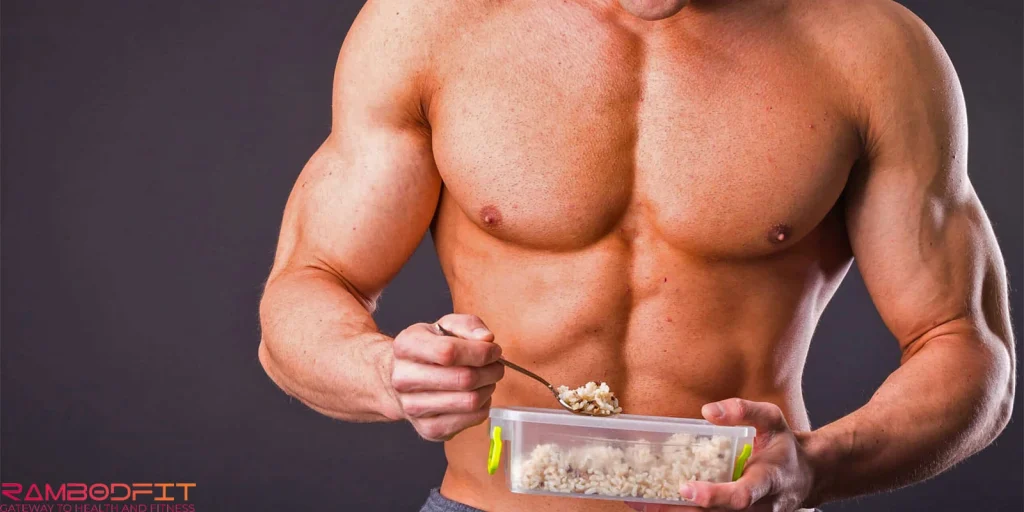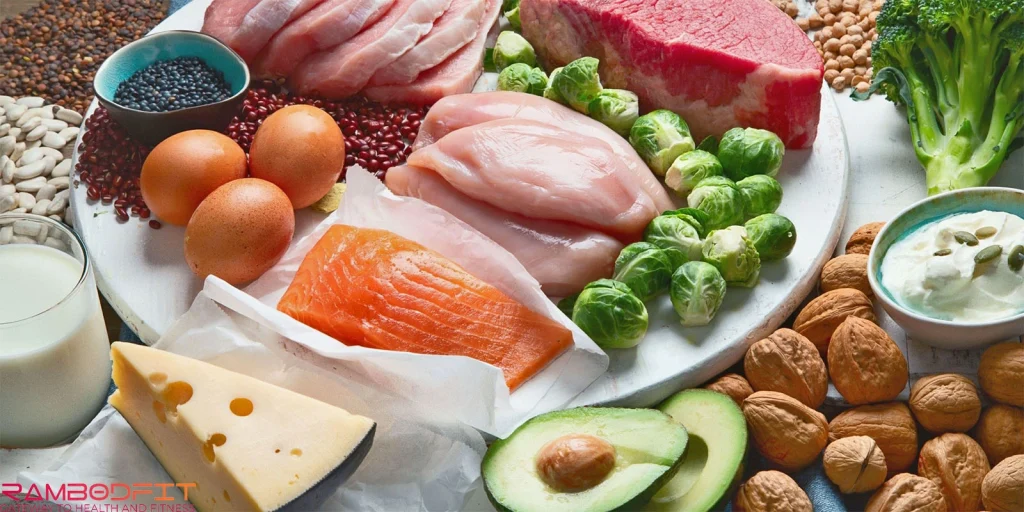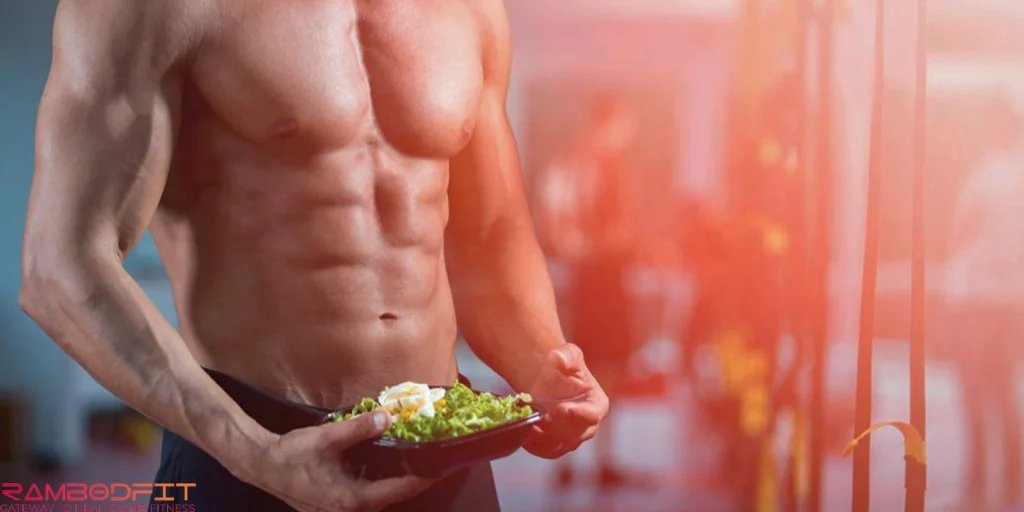


Man, I’ll never forget those first couple months grinding it out at the gym—sweating like crazy, stacking on more weight every week, thinking, “Damn, I’m crushing it.” Except…my body? Not really getting the memo. Honestly, staring in the mirror felt like a bad joke. I kept wondering: am I cursed, or just missing something obvious? Maybe I had the training down, but I hadn’t even thought about dialing in the best diet for muscle growth.
Then, outta nowhere, this old-school gym dude (you know the type—sleeves cut off, knows everyone) just looks at me and goes, “So, what do you eat?” Like, straight up. Didn’t even say hello. That question hit harder than leg day. It was the classic rookie mistake: I thought muscles were all about the grind, not what’s on my plate.
Here’s the thing nobody tells you at the start—if you’re not fueling up right, you’re just spinning your wheels. You can train like The Rock, but if you’re eating like a toddler, good luck growing anything except frustration. The real magic? It happens in the kitchen, not just the squat rack. You need the right stuff, at the right times, or your muscles just…don’t care.
So, here’s the deal. Rambodfit’s gonna break down what actually works for packing on muscle—forget the latest “bro diet” fad or whatever TikTok’s pushing this week. We’ll cover what matters: calories, protein (duh), carbs, and fat (yeah, they matter), plus some real-world examples and classic facepalm mistakes (trust me, I’ve made them).
By the time you’re done here, you’ll know exactly how to build your own diet for muscle—one that won’t make you miserable or broke, and, even better, actually works. No fluff, just the stuff you wish someone had told you from day one. Let’s go.
Table of Contents

Have you ever heard gym bros toss around, “You can’t out-train a bad diet”? Yeah, I used to roll my eyes too, but honestly, it’s spot on. Like, you can crush every workout, but if you’re fueling up on pizza and energy drinks, good luck seeing those gains. If you’re serious about results, you’ve gotta lock in the best diet for muscle growth—otherwise, you’re just spinning your wheels.
Here’s the deal—lifting wrecks your muscles, right? That’s only step one. The cool stuff kicks in while you’re chilling or, you know, doomscrolling on your couch. That’s when your body grabs whatever nutrients you’ve fed it and starts patching up those muscle fibers, making them bigger and beefier. Skip the right foods, though, and your muscles are just stuck in “ouch” mode. Not exactly the superhero glow-up you were hoping for.
Building muscle isn’t rocket science, but it’s also not as simple as just picking up heavy stuff and hoping for the best. You’ve really got two big players in the game: first, you gotta stress those muscles out—like, actually challenge them with enough weight to make ‘em wake up and think, “Whoa, what’s happening here?” Second, you gotta feed them.
I don’t mean just eating random junk; I mean real fuel—enough calories, protein, carbs, the whole shebang—so your body’s got the tools actually to fix and build new muscle. That’s where the best diet for muscle growth really makes or breaks your progress.
Here’s the wild part: science says if you nail the nutrition side, you can turbo-charge your gains by up to 40-50%. That’s not just a tiny bump; that’s like skipping the line at the gym. Imagine two people doing the exact same sweat-dripping workouts—same sets, same reps, everything.
Who’s eating right? They’re recovering faster, getting stronger, and probably flexing in the mirror more often—while the other one’s stuck wondering why they’re sore and tired all the time. Food matters, people. Don’t sleep on it. If you want real results, locking in the best diet for muscle growth is non-negotiable.
When I first hit the gym, I legit thought all I needed was endless chicken breast and those chalky protein shakes. Carbs? Nah, I dodged them like they were the enemy—swore up and down they’d just stack on the pounds. And fat? Forget it. Kept that so low, it’s a miracle my brain even functioned. Not gonna lie, I was cranky 24/7, dragging myself through workouts, and somehow always sore. Total mess.
Then I finally wised up and ditched the diet myths. Got some actual balance in my meals—hello, carbs and healthy fats! Boom. My energy shot through the roof, I actually slept like a human, and hey, my body finally started looking like I lifted. Turns out, chasing the best diet for muscle growth isn’t about cutting everything out—it’s about getting the right stuff in. Funny how that works, huh?
Man, have you ever scroll through fitness TikTok or YouTube? Feels like everyone’s either preaching keto like it’s gospel or swearing carnivore will turn you into a Greek god. Paleo bros, fasting fanatics… they’re all yelling over each other. But honestly, here’s the bit they won’t put in a clickbait thumbnail: there’s no magic diet that’ll make you jacked overnight. The real flex? Figuring out the best diet for muscle growth that works for you, not just whatever’s trending.
Forget the labels. Seriously, slap whatever name you want on your eating plan—it doesn’t matter as much as the basics. High carb, low carb, vegan, steak for breakfast—if you’re not dialed in on the core stuff, you’re just spinning your wheels. Here’s what actually counts:
Why Calories Matter
Calories? Basically, that’s just fuel for your body’s engine. If you wanna pack on muscle, you gotta eat more than you burn—simple as that. Your body needs that extra stash of calories to actually have something to build with, whether it’s protein for muscle, carbs for energy, or fats for, well, everything else. No surplus, no gains. That’s just how it goes. And if you’re serious about results, dialing in the best diet for muscle growth starts right here—with enough calories to actually support those gains.
How Much Surplus Do You Need?
• Brand new to lifting? Lucky you—your body’s basically magic at first. Seriously, you can pack on muscle and burn fat at the same time, even if you’re not eating extra. It’s that “newbie gains” sweet spot, especially if you’ve got a bit of padding to lose. Still, even early on, building the best diet for muscle growth sets the foundation for real, lasting progress.
• Been lifting a while? Sorry, the cheat codes have run out. If you actually want to grow, you’ll need to eat more—think 250 to 500 extra calories a day. Go overboard and you’ll just gain fluff, not muscle. Eat too little? Good luck, you’ll be treading water forever. That’s where the best diet for muscle growth comes in—it’s not just about eating more, it’s about eating smart.
Real-World Example
Man, when I went full-on beast mode with bulking—like, shoveling down an extra thousand calories a day—I packed on 20 pounds in three months. Yeah, 20. But let’s be real, half of that was just straight-up fat. Cutting after that? Absolute torture. Miserable doesn’t even begin to cover it. I had the drive, sure, but not the best diet for muscle growth—just a messy calorie overload.
So, next round, I got smart. Dialed it way back, tried a chill 300-calorie surplus instead. Guess what? Pretty much the same muscle gains, barely any extra fluff. Moral of the story? Don’t get greedy. Slow and steady isn’t just for turtles—it’s for lifters who like their abs and want results without suffering through a brutal cut.
Pro Tips
Why Protein Is Non-Negotiable
Muscles are basically made of protein—think of it as a bunch of amino acids strung together like beads on a necklace. When you work out, you kinda tear those fibers up (don’t worry, it’s a good thing), and your body’s like, “Alright, time to fix this mess.” So, it grabs those amino acids to patch things up and make your muscles beefier. That’s muscle protein synthesis, in a nutshell. And if you want to maximize that process, dialing in the best diet for muscle growth—especially your protein intake—is key.
Optimal Protein Intake
• Shoot for about 1.6 to 2.2 grams of protein per kilo of body weight daily (yeah, that’s around 0.7 to 1 gram per pound if you hate metric).
• Don’t just slam it all down at once—split it across 2 to 4 meals if you actually wanna get the most out of it.
Honestly, cranking it way higher (like 3 grams per kilo) isn’t gonna turn you into The Hulk. You’re just crowding out carbs and fats your body still needs, so… don’t waste your time (or money). Getting protein right is a cornerstone of the best diet for muscle growth, but balance is king.
Protein Timing and Quality
Go for the good stuff—chicken, eggs, Greek yogurt, tofu, beans, you name it. After you work out, grab some protein (like 20 to 40 grams) so your muscles don’t hate you later. Oh, and if you’re vegan? Mix it up! Don’t just live on lentils—get a solid combo of plant proteins so you’re not missing out. Choosing the right protein sources is a key part of the best diet for muscle growth and will help you recover faster and build bigger.
My Experience
Man, I used to slam back, like, three protein shakes a day—on top of my actual meals. I had this genius idea that if I just crammed in more protein, I’d wake up looking like The Rock or something. Spoiler alert: I was totally overdoing it.
Eventually, I ditched the shakes and just ate, you know, actual food—chicken, fish, eggs, the classics. My stomach stopped hating me, and my wallet breathed a sigh of relief. Turns out, more isn’t always better—finding the best diet for muscle growth means focusing on quality real food, not just protein overload.

Role of Fats
Fats are crucial for:
How Much Fat?
Shoot for about 40 to 60 grams of fat a day (that’s like 20–30% of your calories, if you’re counting). Don’t just grab any fat, though—stick with the good stuff: olive oil, avocados, nuts, that kind of thing. Oh, and fatty fish—salmon, sardines, you know the drill. Skip those crazy low-fat diets. Seriously, they’ll mess with your hormones, screw up your recovery, and can even leave you feeling all kinds of moody. Not worth it. Getting the right fats is a key piece of the puzzle when it comes to the best diet for muscle growth, so don’t skimp here.
Why Carbs Matter
Carbs are basically your body’s go-to fuel when you’re hitting the weights. Seriously, they refill your muscles’ energy tank (that’s glycogen, if you wanna get science-y), and you’ll totally feel the difference when you’ve got enough in the tank—better lifts, more reps, all that good stuff. Plus, carbs trigger insulin, which basically acts like a VIP pass for nutrients heading straight to your muscles. Don’t sleep on ‘em. Nailing your carb intake is a must for the best diet for muscle growth—fuel your workouts, fuel your gains.
Best Carb Sources
Rice, oats, potatoes, fruit, whole grains—yeah, all the good stuff. Don’t go nuts with refined sugar, but honestly, it’s not the enemy. Sometimes, after a tough workout, a little hit of fast carbs is exactly what your body wants to bounce back.
Vitamins and Minerals
Alright, here’s the real scoop: magnesium, vitamin D, and zinc kinda work behind the scenes—they’re not the headliners, but trust me, your muscles and hormones would throw a fit without ‘em. Want to keep things running smoothly? Pile your plate with a bunch of vibrant fruits and veggies. Seriously, your body will thank you. These micronutrients might not get the spotlight, but they’re essential for supporting the best diet for muscle growth and keeping your recovery and hormone game on point.
Hydration
Honestly, even if you’re just a little dehydrated—like, barely 1 or 2 percent—you can lose up to 10% of your strength. Wild, right? So, yeah, chug your water. Shoot for at least 3 to 4 liters a day, and if you’re working up a sweat, you’ll probably need even more. Your muscles will thank you.
Alright, here’s how a real person might scribble that menu down—probably while half-awake and hungry:
Breakfast (8 AM)
Snack (11 AM)
Lunch (2 PM)
Pre-Workout (5 PM)
Post-Workout Dinner (7 PM)
Evening Snack (9 PM)
This is the kind of real-world eating that nails the best diet for muscle growth—balanced, simple, and flexible enough to keep you sane while crushing your goals.
• Packing on pounds like there’s a prize for speed? Yeah, that’s just gonna make you squishier, not swole.
• Skipping out on rest? Good luck growing muscle when you’re running on fumes and stress hormones.
• Gettin’ all obsessed with “paleo” this and “keto” that—honestly, just nail the basics before you start naming your diet like it’s a designer brand.
• Chugging protein shakes like they’re magic? Bro, real food > supplements, every single time.
• Slashing carbs down to nothing? Say goodbye to energy and gains. You’re not a robot; your body needs fuel.
These aren’t just random tips—they’re the no-BS essentials to building the best diet for muscle growth and making real, lasting gains.

Honestly, forget all those flashy diet fads. If you wanna pack on muscle, it’s really just about nailing the basics: eat a bit more than you burn, get plenty of protein, don’t skip healthy fats, throw in some carbs when you need ‘em, and don’t ignore your vitamins and minerals. That’s the foundation of the best diet for muscle growth. Oh, and actually lift weights—and don’t treat rest like it’s optional. Your muscles need time to chill, too.
As for the “best” diet? Man, it’s the one you can actually stick to without losing your mind. If you can’t see yourself eating this way next year, what’s even the point? Science matters, sure, but so does not hating your life. The best diet for muscle growth is one that fits your lifestyle, keeps you sane, and delivers results.
Reference and Further Studies
Totally doable, but you gotta think it through. Load up on stuff like lentils, beans, tofu, tempeh—honestly, anything soy is your friend here. Seitan’s a beast for protein, too, if you’re cool with gluten. Mix things up—like, rice and beans together? That’s where the magic happens for full amino acids. Oh, and don’t skip the B12 supplements, unless you’re into feeling like a zombie. Some folks toss in creatine too, just for good measure. Getting this right is essential if you want the best diet for muscle growth on a vegan or plant-based plan.
• Just starting out? You might pack on 1–2 pounds a month, easy.
• Been hitting the gym for a while? More like half a pound to a pound each month.
• Veterans and gym rats? Yeah, you’re looking at a snail’s pace—maybe a quarter to half a pound per month, if you’re lucky.
The closer you get to maxing out your genetics, the more your progress crawls. Honestly, it’s all about sticking with it and not losing your mind over slow gains. Patience is the name of the game, and having the best diet for muscle growth locked in makes those gains easier to come by.
Creatine’s a no-brainer—it’s dirt cheap, ridiculously well-studied, and actually works. You want more muscle or to lift heavier? Grab some creatine. BCAAs though? Meh. If you’re already crushing enough protein (think chicken, eggs, or just a scoop of whey), you’re covered. Buying BCAA supplements on top is kinda like paying extra for guac when you already have an avocado at home. Total overkill. When it comes to the best diet for muscle growth, smart supplementation like creatine can help, but don’t waste cash on unnecessary extras.